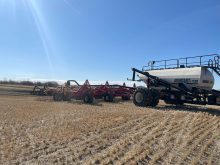With only old, wooden elevators to buy crops around Unity, Saskatchewan, farmers like Mervin Slater banded together in 1993 to sell shares and build a modern grain terminal.
The towering concrete and steel facility is one of nearly a dozen farmer-run grain terminals to spring up on the Canadian Prairies since the 1990s, offering farmers a homegrown option to the former pools and private grain companies.
It s control of our own destiny, that s all, Slater, a board member of North West Terminal, said in an interview. … We wanted our own community thing.
Read Also

CUSMA access key among other trade noise: Seeds Canada panel
Seeds Canada conference panelists say Canada needs to stay focused and wait as U.S. trade and tariff chaos develops, and a Canada-U.S.-Mexico Agreement review looms
Now the Prairie grain belt is about to see its biggest change since the Second World War as the Canadian Wheat Board marketing monopoly looks to end next August, and some fear that farmer-run terminals will be unable to compete in an open market.
Instead of relying on the wheat board to line up buyers and port storage space for two-thirds of their grain-handling volume, the farmer-run terminals will have to do so themselves, even though many don t own port space or have the same breadth of overseas contacts.
Farmer-run terminals handle roughly 2.6 million tonnes of crops annually, mostly board-controlled wheat, durum and barley.
These companies are going to have to do things differently, said agriculture industry analyst Greg Kostal.
In three to five years, you re probably going to see a different landscape and this infrastructure could easily become part of that.
If government legislation passes next month, the wheat board will lose its marketing monopoly on Prairie wheat and barley for milling or export in August 2012.
Most of Western Canada s farmer-run terminals operate independently of big grain handlers like Viterra Inc., Cargill Inc., and Richardson International Limited, who own networks of country elevators linked to port facilities.
Those that are allied with majors have big brother looking out for them, said Brett Meinert , who farms near Shaunavon, Saskatchewan and sits on the board of South West Terminal, a joint venture with Cargill. Those who are not aligned and financially insecure may be targets for takeovers.
In an open market, farmer-run terminals are concerned they will have to secure port space from grain companies against whom they compete in buying crops from farmers, said Kevin Hursh, executive director of the Inland Terminal Association of Canada.
The other thing is it will take a lot of resources to buy wheat, durum and export barley, so credit will be a concern, Hursh said. You don t have as deep pockets to make the purchases because you have to wait for the money to come back (from buyers).
Slater expects grain terminals to do just fine. Along with board grains, terminals already handle legumes and canola on the open market, he said.
Volume-driven grain handlers will be eager to move as much grain as possible through their port facilities, Meinert said, but added they will likely handle their own crops first.
Some farmer-run terminals can also overcome the cash-flow quandary by negotiating different payment schedules with buyers, many of whom they already deal with for non-wheat board crops, Meinert said.


















